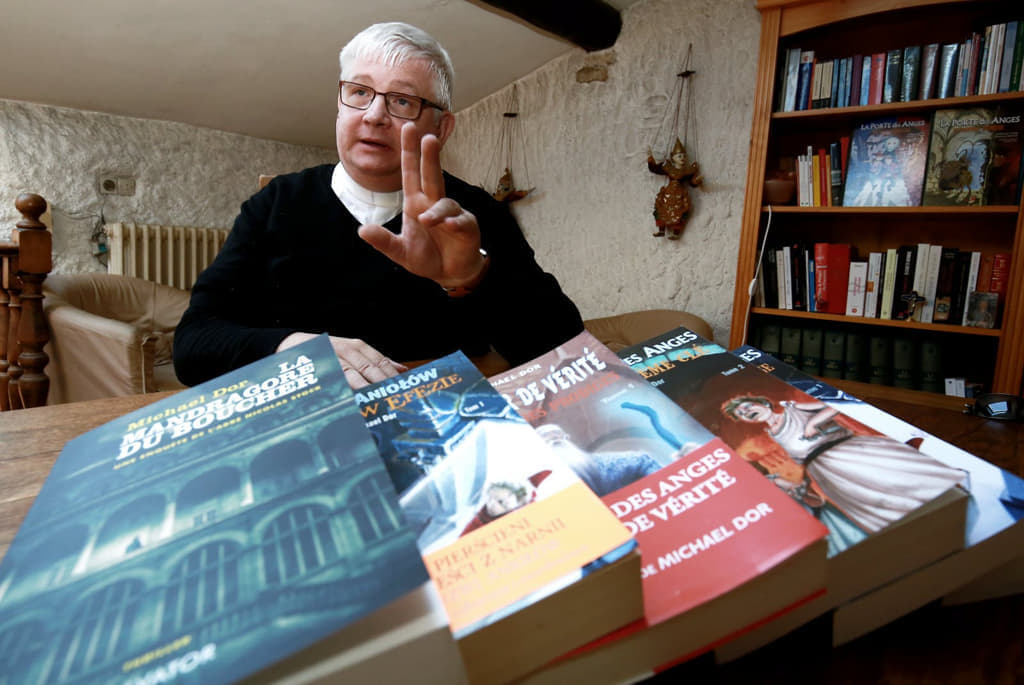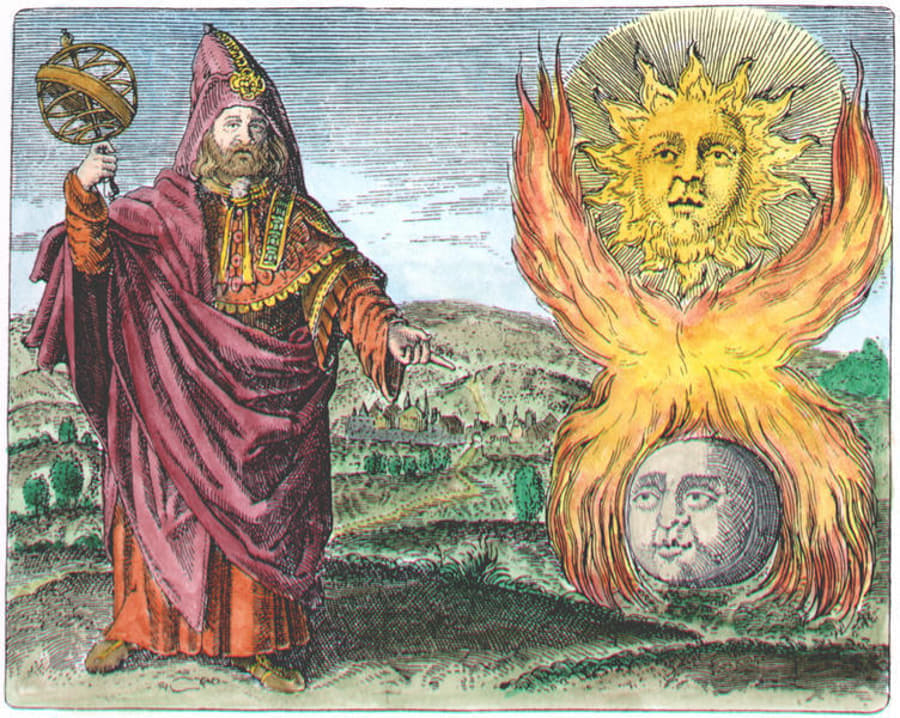Father Jean-Christophe Thibaut has been following the “new spiritualities” for over twenty years. He has published a fascinating book which allows us to better understand and apprehend this phenomenon. He is in conservation with Christophe Geffroy of La Nef, through whose kind courtesy we bring you this interview.
Christophe Geffroy (CG): How did you become interested in magic and esotericism?
Father Jean-Christophe Thibaut (FrJ-CT): From a very young age, I asked myself questions about the meaning of life. My parents, who were atheist and anti-clerical teachers, were unable to provide the answers I was looking for. So, I decided to do my own research with what I could get my hands on. At the age of 8, I discovered the use of the pendulum, then, at 13, spiritualism. From there, I devoted myself entirely to the study of esotericism and occultism. During my studies at the university, I even became a Luciferian. It was in this context that, against all odds, I experienced Christ the Savior. A few years after my conversion, when I entered the seminary, the bishop of my diocese asked me to train in this field in order to help those who, like me, are tempted by magic and esotericism.
CG: Could you define precisely what magic and esotericism are? And where do they come from, what are their stories?
FrJ-CT: Magic and esotericism are not synonyms. Magic uses techniques to obtain material results, but using supernatural means, with the help of rituals (incantations) and certain objects (crystal ball, wand, cards, pendulums, etc.).

Esotericism is a “catch-all” term in which we group together all the somewhat strange subjects (UFOs, divination, alchemy, etc.) without them necessarily having a link between them. But, originally, this neologism, coined in 1828 by a Protestant pastor, designated a group of beliefs that had Christian appearances, but were based on principles different from those taught by the Church. What they had in common was the belief that salvation depended not on divine grace, but on a primordial knowledge—the Tradition of the Ancients—which man had forgotten since the fall of his soul into matter (the body), but which he could recover thanks to a few initiates. Those who reach this “gnosis” (knowledge) are not satisfied with the “exoteric” teaching of the Churches, but reach a knowledge so powerful that it provokes an illumination, a “transmutation” of the impetus made capable of “going up” to its First Principle (God) from which it emanates. Occultism, for its part, designates the application of this esoteric knowledge in different fields, such as alchemy, astrology, divinatory arts, magic, etc.
CG: What do magic and esotericism represent today? What percentage of the population does it affect? And does it concern a particular fringe of the population or not, in other words who is affected by this phenomenon?
FrJ-CT: It is not possible to give precise figures, especially since some people today use magical principles without always being aware of it. For example, some alternative therapies or personal development methods are based on principles directly inspired by magic. What is certain is that sociologists note a development of a “magical mentality.” This phenomenon affects all social classes, cities as well as the countryside. The latest surveys show that one Frenchman in four consults fortune tellers and that 58 percent declare that they believe in an occult science. There are more than 100,000 declared astrologers and mediums, to which we must add those who practice secretly. But it is above all young people who are seduced by esotericism: 70 percent of 18 to 24 year-olds have a favorable opinion. We are witnessing a strong return of witchcraft, spiritualism and shamanism.
CG: How can we explain such a craze for magic and esotericism in a society where Christianity, although in retreat, proposes a much more coherent spirituality that has shaped our historical being?
FrJ-CT: First of all, it should be noted that many of our contemporaries differentiate between religion and spirituality. Religion is perceived as a confinement in dogmas and rites to be accomplished, where one must follow an imposed truth. On the contrary, spirituality is considered as a space of freedom where each one can seek God, the divinity, the absolute, as he wants and in the way he likes. Each person is the priest of his own religion, which he builds according to his desires and intuitions.
Moreover, for many, spirituality is necessarily Asian (Hinduism, Buddhism, etc.) and not Western, let alone Christian. Meditation is preferred to prayer as a deeper experience of the inner life. Instead of Mass, we prefer various practices (shamanism, sophrology, hypnosis, yoga, reiki, etc.) that claim to open people to spiritual dimensions buried within them. However, there is a profound misunderstanding, because these Eastern religions have been reformatted to Western taste, and, above all, emptied of their religious content. These pseudo-spiritualities are more like personal development techniques, where the search for God is only a pretext for a quest for oneself, for one’s deepest self.
Spirituality is only of interest insofar as it can bring something immediate and concrete: a well-being, an inner peace, a better physical and psychological health. There is therefore no gratuitousness, no search for truth and no love. Spirituality has become a marketing product, while the Christian religion is perceived as a relic of the past in the process of disappearing.
CG: How are magic and esotericism dangerous, and what are the possible consequences for people who practice them? How to get out of it?
FrJ-CT: Magic, like esotericism, is based on the principles of ancient paganism: there is no creator God, but everything that exists is an emanation of a first principle (God and the cosmos are one). The Earth is a living being. All the elements of the world, the macrocosm (Earth, planets, etc.) and the microcosm (men, organs, cells) are in correspondence: we are thus subjected to forces which exceed us. There is no good or evil; they are only polarities that must be brought into harmony, etc.
All this thinking is contrary to biblical revelation. By adhering to this thought, one rejects all that God has revealed to us from Abraham to Jesus Christ. And this, it seems to me, is the real danger: by following a false thought, by preferring to trust in spirits or occult forces rather than in God and His divine Providence, we play into the hands of the Liar. Esotericism is a form of idolatry and magic always ties us to a demon. By distancing ourselves from God and the truth, we risk losing ourselves. Damnation is the Devil’s primary goal. To practice magic is to open the door to demonic forces. We must close them with determination by returning to God, through the sacrament of reconciliation, or sometimes by asking for the help of the prayer of exorcism and deliverance when necessary.
CG: Why does the Church speak out so little on these issues?
FrJ-CT: I believe that if the Church of the first centuries was very attentive to preserving the “deposit of faith” and avoiding falling into the traps of the devil, the Church today perhaps does not pay enough attention to these questions which are nevertheless of primary importance. There is a fear of the irrational. But it is enough to return to what the Fathers of the Church and the theologians have taught us. There is an urgent need for formation and training of the clergy.
CG: What advice would you give, especially to parents, to avoid falling into the trap of magic and esotericism? Is fantasy literature a risk in this respect for young people? How to discern?
FrJ-CT: Magic and esotericism are fascinating. And yet, they often lead to a real confinement. I think it is important to talk about it, not to make it a taboo. We must also be careful when we adopt relaxation methods, seductive therapies. It is not because they “work” that they are necessarily good. One must accept to make a discernment.
Fantasy literature is not bad in itself, but one must be careful that it does not distill an esoteric message. It is good for parents to read these books or at least talk about them with their children. Television series currently focus on witchcraft and magic, while presenting Christianity in the cheesiest light. Peacefully, with humor and tact, but firmly, we must denounce all forms of manipulation of thought. The first Christians did it in their time. It is our turn to remain vigilant!
Featured: “Hermes Trismegistos,” from Stolcius, Viridarium Chymicun, 1624.
